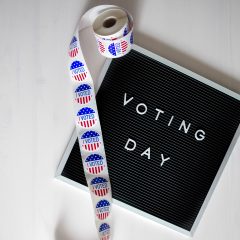Among many Democratic candidates for the 2020 Presidential election, there are Kamala Harris and Elizabeth Warren. Kamala Harris is a Democratic member of the U.S. Senate from California. When she was elected in 2016 to the Senate, she became the second African American woman and the first Indian American woman elected to serve in the United States Senate. Harris was formerly the attorney general of California, where she became the first African American and Asian American female to have the position. Harris was born in Oakland, California. She earned her law degree and served as a deputy district attorney and eventually became the attorney general of California, before announcing her candidacy for president of the United States (Kamala Harris Ballotpedia). Harris is a lifelong public safety and civil rights leader (Kamala Harris). Elizabeth Warren is a Democratic member of the U.S. Senate from Massachusetts. She was born in Oklahoma City, Oklahoma and grew up in the middle class. Warren eventually earned a bachelor’s degree in speech pathology from the University of Houston. She then went to Law school soon after and began to teach law at several prestigious universities. She became the Senator of Massachusetts in 2012 and formally declared her candidacy for president of the United States early this year. Warren has a background in both government and academia (Elizabeth Warren Ballotpedia).
Warren and Harris have put emphasis on several of the same issues. On her official website, Harris shows she is “For the People”, as this is her slogan, along with “Speaking Truth, Demanding Justice”. These reflect her interests in issues and her background, as she makes it clear that she is a defender of American values and the American people. She hopes to fix the broken criminal justice system and take on Wall Street banks for middle-class homeowners. Warren’s slogan is “We Will” or “Fighting for America’s Promise for All of Us”. Similar to Harris, Warren bases her campaign on her promise to fight for America and the American people’s best interests. The pictures on her official website reflect her slogan and theme, because they include pictures of her with children of various ages and races, reinforcing her goal, “fighting to give every kid the same chance to succeed” (Elizabeth Warren). Other pictures show her with supporters in the middle class fighting for union jobs or protesting Wall Street. These support her themes, because she hopes to “rebuild the middle class” and “end Washington corruption” (Elizabeth Warren). Harris’s pictures on her official website do not effectively represent her cause because the majority are solely of her. One picture, though, may help support her theme because it shows her among the American people.
Both candidates are more issue-oriented, but Warren may be more personable than Harris. Warren’s website has a list of her focus of issues, but reading into the issues and pictures, it seems that Warren takes a person-to-person approach. Harris, differently, is mainly about issues. Although her slogan is “For the People” she goes with a more issue-oriented approach, stating issues she feels need handling and stating her goals for America and American people. In the media, Warren’s coverage lately has been less serious, jokingly referencing her chasing a train (Lang, Photo), but other stories cover her agenda for presidency (Patterson). Harris has mostly positive coverage, reporting her plans to raise teacher salaries, and her use of small donors for fundraising (Goldmacher, Reilly, Scott). It appears that both candidates put emphasis on being for the people and promise to work in the American people’s best interest. Despite some differences, Kamala Harris and Elizabeth Warren are quite similar with their common themes and goals as President.
